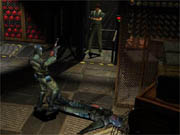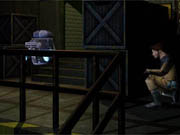In Cold Blood tells an interesting story, and tells it well. It's a good enough story to keep you playing despite the game's many problems, and it eventually make you want to ignore these problems altogether. You play as John Cord, a British spy with a James Bond complex who works for an undisclosed agency. Your first task is to find a missing American agent, who is imprisoned in a uranium mine in the fictional Russian state of Volgia. While exploring the mine, you'll find something else entirely. The Volgians, it seems, are up to something very strange. They've harnessed a strange form of energy, and their intentions for its use are unclear.

From this starting point, the game takes off in unusual directions. It flirts with science fiction without becoming too fantastic, and there are so many twists, turns, and complications that it remains consistently interesting. And it gets progressively more disturbing, with both sad and startling moments along the way. The nature of the narrative is interesting as well. Much of the game is told in flashback--each mission is framed as one of Cord's confessions during what appears to be a very painful interrogation session.
It's good that the story is interesting, because the game suffers from being a bit light on both action and adventure. In Cold Blood is similar to Metal Gear Solid, but without that game's ingenious employment of its mechanics. You'll run into plenty of opponents, but the combat is fairly easy. It's great that Cord can dispatch enemies from behind with a single blow, but you can just as easily shoot your way through most levels. Occasionally, remaining unseen will be a key to success, and the game would have been better overall if more of its areas required you to think your way past guards.
The puzzles are pretty straightforward. They're more complex than those found in most console action-adventures, such as Resident Evil, but experienced adventure gamers will have little trouble getting past In Cold Blood's toughest roadblocks. Even so, many of the puzzles work well within the game, and require you to find some key piece of information before you can continue. There are a few truly bizarre puzzles--using a particle accelerator as a glorified crossbow, for example--but they're good for the most part. And when they aren't good, at least they're simple. Your REMORA device, which lets you hack into most electronic devices, will actually solve a good majority of the potential puzzles for you, decrypting passwords and opening locked doors and the like.
If the REMORA can't figure it out, Cord often will, and at times the game seems a bit too eager to ease. For instance, at one point you must find a means to disable a huge gun. All you need to do is find the right computer, and Cord will tell it what to do. His solution is rather ingenious, but the game might have been better off had you been required to figure it out for yourself. When you do get to solve the puzzles yourself, the solution will usually be obvious from the elements at hand, and only a few will require you to move more than a room away to find whatever it is you need to move on.
There are also a few action-oriented puzzles. These are made frustrating by the game's terribly imprecise movement. Cord will often get stuck on objects and walls, and doorways not clearly in view tend to be terribly hard to move through as a result. The interface can also make combat frustrating, as you must hold down one key to draw your weapon and another to fire it. Firing from a crouched position requires the holding down of a third key. Luckily, the keys are all close to one another, but it would have been more logical to have keys that toggled your stances, instead of forcing you to play chords on your keyboard.
Another problem with the interface involves the most basic actions in the game. When you interact with an object, you push an action key. This is straightforward and good, except you can interact with almost anything from any position in the room, which can be frustrating. You'll be trying to get Cord to access a computer terminal in one corner of a room, but every time you push the action key he'll walk across the room to call the elevator.

In Cold Blood does include some inspired gameplay elements. For instance, pointing your gun at people will often cause them to divulge more information than speaking to them in a friendly tone will. Small touches like this add enjoyment to the game. The dialogue is good, and the voices are great. In Cold Blood manages to be slightly funny at times, but even when the humor fails, it does so with dignity--it has little of the embarrassing sort of failed humor found in many games.
That the story is enough to keep you involved says a great deal about the pacing of the game. The music and the visuals both help create an almost relentless atmosphere of suspense and tension, and the simple game mechanics help keep the pace brisk. Those who want action instead of fiction will find the game somewhat dull, but those who appreciate an original story and great atmosphere will find In Cold Blood to be a satisfying blend of espionage and science fiction.



